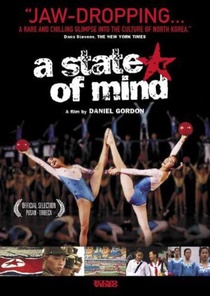A film két fiatal tornászlány és családjuk életét követi nyolc hónapon át, ahogy a Mass Games-re készülnek.
Várólistára tette 5
Kiemelt értékelések
Jó pár észak-koreai filmet láttam már, de azokban sosincs direkt propaganda – és ha szóba is kerül a hazaszeretet vagy a Vezér, akkor az valahogy természetesnek hat és beleilleszkedik az adott történet menetébe. Ennél a filmnél azt hittem hogy ez is csak egy „sima és átlagos” dokumentum film, erre meg kiderült, hogy nagyon nem. És bár a film maga tényleg jó és érdekes, de engem teljesen váratlanul ért a mindent elárasztó propaganda. Nagyon hátborzongató volt.
És felmerült bennem egy kérdés: vajon mit gondolt az a brit cég, aki leforgatta ezt a filmet, mégis kinek tesz vele jót? Mármint azon kívül, hogy kiszolgálja Észak-Korea igényeit, saját magának meg profitot és hírnevet termel. Értem én, hogy csak úgy kaptak forgatási engedélyt ha minden szigorú feltételbe belemennek, ha nem mutatnak-mondanak semmi kritikusat, és hogy tényleg nagy dolog volt ez az egész forgatás – de azért utólag nagyon finoman utalhatnának a körülményekre, vagy a megkötésekre, vagy még jobban kiemelhetnék hogy itt az elitről van szó, stb. Ehhez képest a cég honlapján lévő ismertetőben csak lelkesen tapsikolnak saját maguknak, hogy „never-before-seen images of state regulated schools, pubs and artistic performances, it is its daring ability to illustrate 'the hardships of their lives in a manner almost never permitted by the Pyongyang government' (Washington Post) that makes this film a 'fascinating' (Sunday Telegraph) documentary” … és ez így valahogy olyan, mintha egyetértenének mindennel, ami ott történik.
Népszerű idézetek
narráció: Since the formation of the Democratic People's Republic of Korea on 1948, the State has imposed an all encompassing belief structure on the people. The placement of Mass Games within this structure has never been more significant. For the participants it enforces submission to the group. For the audience it is an inspiration to behold the values of teamwork and the glory of the State and the Leader.
narráció: Hyon Sun's group is training for the next Mass Games which are due to be held in July to commemorate the 50th anniversary of the end of the Korean War, a war known in the West as the Forgotten War; in North Korea, as the Victorious Fatherland Liberation War.
narráció: Housing is allocated by the State. Pyongyang is not representative of North Korea, it is the showcase capital. For its two million residents, it's considered a privilege to live here. State radio is piped to every kitchen in the block. Listeners can turn the volume down, but not off. […] Hyon Sun's television is a gift from the State, a reward for her performance in the Mass Games of 2002. There is only one channel. It broadcasts propaganda news, films and entertainment for five hours per day.
Hyon Sun: Because we're always doing things like air raids and blackouts, I think, just as we're taught at school, we have to endlessly hate the U.S. and fight them to the end.
tanár: Where are the U.S. imperialist aggressors attacking at the moment?
osztály: Iraq.
tanár: Looking at the state of affairs in the world at the moment, it's clear that the U.S. imperialists cannot rest even for a moment from invading other countries.
Hyon Sun: Whenever I go home, my grandmother tells me to do homework or study. So when I come home from school, I stay out of my grandmother's sight and go out to play.
narráció: The market will be state owned but some stalls will be privately run. It is a wholly foreign concept to him.
nagypapa: As far as I know, I'm building something called a market. There's no question that it's being built in order to improve people's lives in the future. But I don't know yet how it will be run. We people are all curious about such a market.








